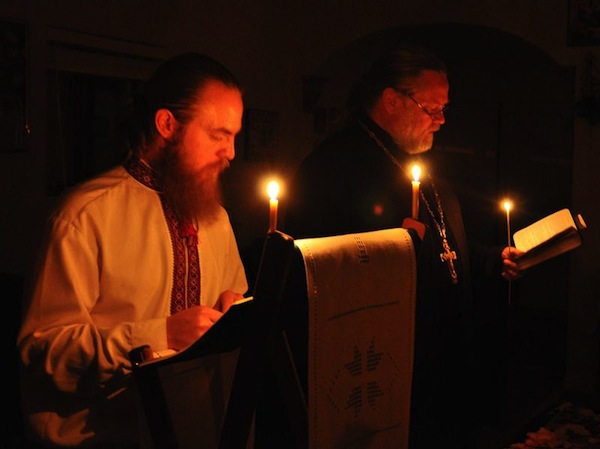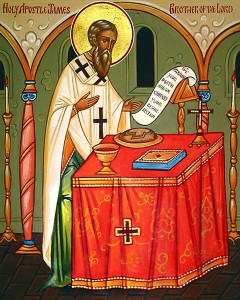Music Monday: Christ is risen!
I thought we’d head back to eastern chant for the next few Mondays. Here’s the “Christ is risen!”:
Christ is risen from the dead,
trampling down death by death,
and on those in the tombs bestowing life!
"We are travellers…not yet in our native land" – St. Augustine
I thought we’d head back to eastern chant for the next few Mondays. Here’s the “Christ is risen!”:
Christ is risen from the dead,
trampling down death by death,
and on those in the tombs bestowing life!
A couple of months ago I hung out with the Eastern Orthodox young adults of San Diego and attended a talk by Dr. Jeannie, who also happened to have taught one of my friends theology at USD. Her website has a tremendous wealth of free MP3s which are well worth checking out:
Last night, the Eastern Orthodox Young Adult group in San Diego had their monthly meeting, led by Fr. John Strickland. The discussion that evening focused on the differences between Catholicism and Orthodoxy. I attended the evening, together with some of my Eastern and Western Catholic friends and I’m very pleased to report that it was a friendly and respectful discussion between brothers and sisters in Christ.
As you might expect, the subject of the Eastern Catholic Churches came up. To make up for whatever was lacking in my explanations, below is a link to an Ancient Faith Radio interview of Father James Babcock, an Eastern Catholic priest in Placentia:
“Let us love one another that with one mind we may confess…
the Father, Son and Holy Spirit, the Trinity, one in essence and undivided.”
– Liturgy of St. John Chrysostom
A very short post today. I just wanted to share a little “ah hah!” moment I had recently.
A little while back I went to vespers at an Eastern Orthodox parish. The format of the service was almost identical to that of my Eastern Catholic parish. The only real differences were alternative melodic forms and slightly different English translations.

During my visit I noticed something about the translation of one of the psalms. Several times Israel was referred to in the masculine form, “him”. This rather surprised me since I typically think of Israel as feminine, the people to whom God has espoused Himself and which, under the New Testament, flowers into the Church, the Bride of Christ.
…I will make a new covenant with the house of Israel and the house of Judah, not like the covenant which I made with their fathers…which they broke, though I was their husband, says the Lord. – Jeremiah 31:32
After Vespers a few of us were talking to the priest and I raised this question. We agreed that Israel was probably referred to using the masculine gender to highlight the relationship of sonship between God and Israel:
And you [Moses] shall say to Pharaoh, ‘Thus says the Lord, Israel is my first-born son, and I say to you, “Let my son go that he may serve me”…’ – Exodus 4:22-23
Under the Old Covenant, God became Father to Israel and Israel became God’s first-born son, the elder brother among the nations, to manifest the wisdom of God and to lead the Gentiles back home.
The article Androgynous Israel? first appeared on RestlessPilgrim.net
My friend Jenna, a life-long lover of Ryan Gosling, sent me a link to Eastern Orthodox Ryan Gosling, a variant on the Hey Girl meme. Here were some of my favourites:
 Below is the text that we will be studying in JP2 on Thursday. It is an abridged form of the ancient Liturgy of St. James. This version of it comes from around the 4th Century.
Below is the text that we will be studying in JP2 on Thursday. It is an abridged form of the ancient Liturgy of St. James. This version of it comes from around the 4th Century.
This is the oldest Eucharistic liturgy still in use today. It was also the blueprint used for the Liturgy of St. Basil and the Liturgy of St. John Chrysostom, both of which are regularly used among Byzantine Catholics and Eastern Orthodox today.
Priest: Peace be with you.
People: And with your spirit.
Priest: The Lord bless us all, and sanctify us for the…celebration of the divine and pure mysteries… Amen.
Deacon: In peace let us pray to the Lord. For the peace that is from on high, and for God’s love to man, and for the salvation of our souls, let us pray to the Lord. For peace in the whole world, for the unity of all the holy churches of God, let us pray to the Lord. For the remission of our sins, and forgiveness of our transgressions, and for our deliverance from all tribulation, wrath, … and distress…, let us pray to the Lord.
Singers: Holy God, holy mighty, holy immortal, have mercy upon us.
Priest: O compassionate and merciful, patient, gracious, and true God…hear us. Deliver us from every temptation of the devil and man… For we are unable to overcome what is opposed to us. But you are able, Lord, to save us… Because you are holy, Lord our God, … we send up the praise and the thrice-holy hymn to you, the Father, Son and Holy Spirit, now and forever, and for all eternity.
People: Amen.
Priest: Peace be with you.
People: And with your spirit.
Singers: Alleluia.
[The liturgy proceeds with readings from the Old and New Testaments]
Deacon: Let us all say: Lord, have mercy.
Lord Almighty, the God of our fathers: We beseech you, hear us. For peace from on high, and for the salvation of our souls, let us pray to the Lord… For the people standing and waiting for the rich and bountiful mercy that comes from you, we beseech you, be merciful and gracious.
Save your people, O Lord, and bless your inheritance. Visit your world with mercy and compassion. Exalt the horn of Christians by the power of the precious and life-giving cross. We beseech you, most merciful Lord, hear our prayer, and have mercy upon us.
People: Lord, have mercy, Lord have mercy, Lord have mercy.